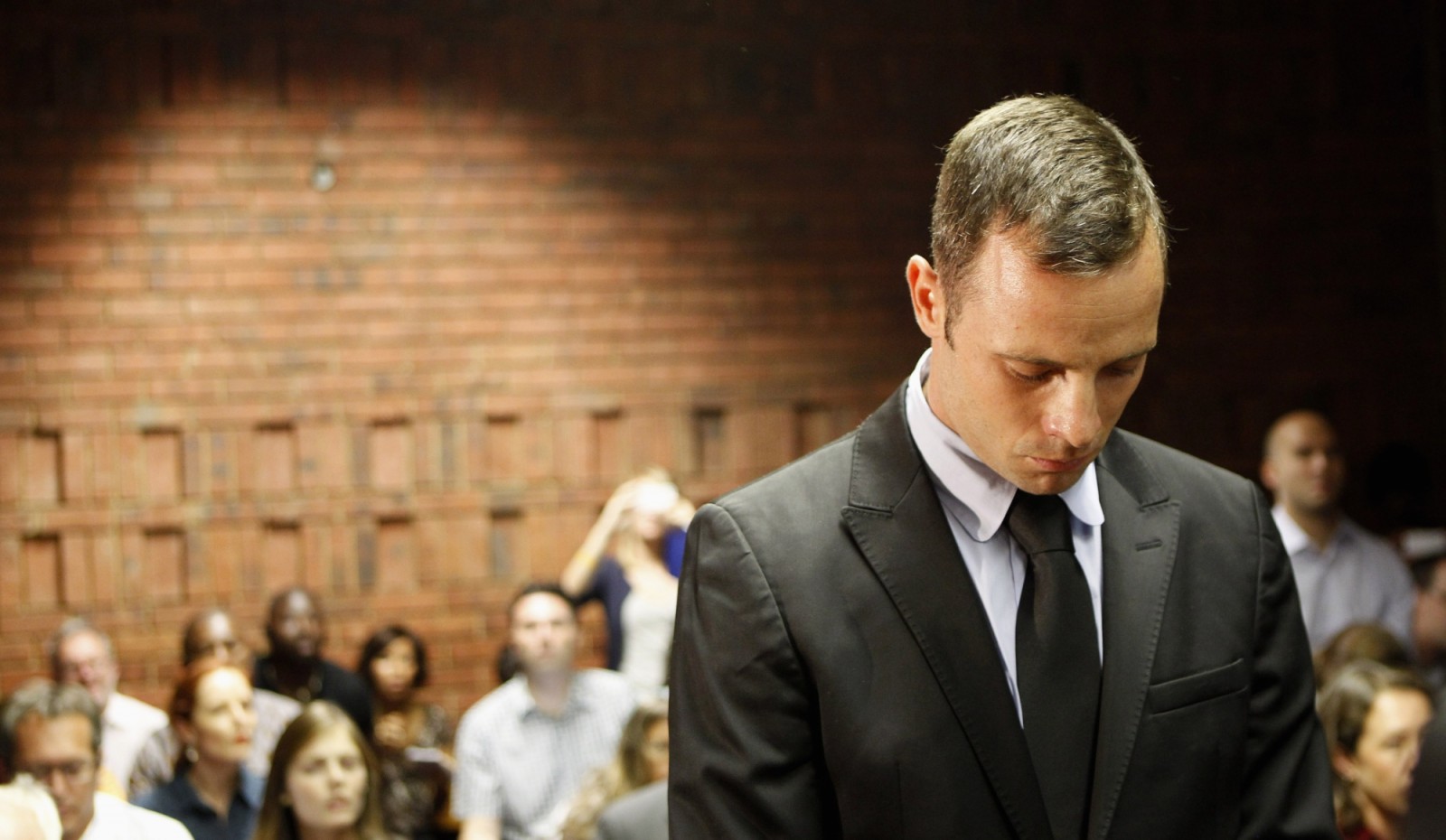More than a year since Oscar Pistorius shot dead Reeva Steenkamp at his home – we have finally heard him speak about the tragedy in his own words.
The Paralympic sprinter was called by his defence lawyer at around 11am UK time on Monday.
As a hush descended around the court, he walked nervously from the dock to the witness block, carrying his glasses, before the camera images had to be turned off.
The judge granted an order preventing Pistorius’ being filmed while giving evidence, and so we strained to hear him speak.
Here’s five things we learned from Oscar’s first day in the dock.
1. Apology
The 27-year-old began by making a tearful apology to the Steenkamp family and friends.
He said: “I would like to take this opportunity to apologise to Mrs and Mr Steenkamp.
“To Reeva’s family. To those of you who knew her who are here today.
“There hasn’t been a moment since this tragedy happened that I haven’t thought about your family.
“I wake up every morning and you’re the first people I think of and I pray for.
“I can’t imagine the pain and the sorrow and the emptiness that I have caused you and your family.
“I was simply trying to protect Reeva.
“I can promise you that when she went to bed that night she felt loved.”
The runner went on to admit he had wanted to send the family a letter but could never find the right words.
In the public gallery, Reeva’s mother June and father Barry remained stone-faced, while Oscar’s family looked tearful.
The apology felt sincere, but there seems very little doubt that Pistorius clearly regrets what happened.
But was it really an accident?
2. Nightmares
Asked about how he has coped with shooting Reeva, Pistorius said he remains so disturbed he has now takes medication.
He told the court he has been prescribed an anti-depressant and sleeping pills.
“I have terrible nightmares about the things that happened that night,” he said.
“I wake up and I can smell blood. I wake up to being terrified.
“If I hear a noise I wake up in a complete state of terror – to the point where I would rather not sleep.
“For many weeks I didn’t sleep. In March or April last year I’d lost a significant amount of weight.
“I sought medical advice to start medication for sleeping.”
3. Oscar the hero
Defence lawyer Barry Roux spent a lot of time getting Pistorius to talk about his childhood and his disability.
He told the court about being born without a fibula in both of his legs and how they were eventually both amputated.
Oscar grew up using prosthetic legs but was taught by his parents never to feel sorry for himself, he said.
We were taken through his journey from a schoolboy who tried lots of sports but wasn’t very good at any of them, to the first double amputee to compete at the Olympics in 2012.
And this despite losing his mother very suddenly at the age of 15.
The ploy was to remind the court of just what a unique global star Oscar Pistorius became.
The athlete talked about his court battle to allow him to compete in the Olympics and his devastation at missing out on Beijing in 2008.
Reliving his life story was a stark reminder of what a spectacular fall from grace this trial has proved to be.
4. South Africa is a dangerous place
Many of the witnesses in this trial have illustrated that crime is clearly a concern for the vast majority of South Africans.
When asked about his experience of crime, Pistorius said: “I think everybody in South Africa has been exposed to crime at some point.”
He went on to talk about suffering break-ins in his childhood home with his mother after his parents divorced.
She felt so scared she would keep a gun under her pillow, he said.
He claimed to have been beaten up at a party and followed several times and even shot at on one occasion.
All this coupled with the fact that Pistorius has to rely on prosthetic legs was designed to show he is a vulnerable character.
The tactic largely appeared to have worked but it might be asked whether Roux strayed too far in trying to gain sympathy for Pistorius.
After all, this is a man who admits shooting a young woman dead.
5. Gerrie Nel attacks the defence pathologist
Before Oscar took to the stand, we heard from Dr Jan Botha, a pathologist called by the defence.
He gave lengthy evidence to dismiss the opinion of the state pathologist, Professor Gert Saayman, that Reeva ate a meal a few hours before her death.
This was damaging to the defence because in Oscar’s version of events the couple went to bed at 10pm.
She was shot at around 3am and Prof Saayman said on the basis of ‘gastric emptying’ i.e. the amount of food in her stomach, she would have eaten at around 1am.
But Dr Botha said gastric emptying is a “highly controversial” science which cannot be relied upon.
State prosecutor Gerrie Nel took the opportunity to show off his ferocious cross examining skills.
He tore into Dr Botha, especially about further evidence he gave concerning the sequence of the gunshots.
Pistorius watched all of this from the dock, surely getting more and more nervous about the prospect of being interrogated himself.







